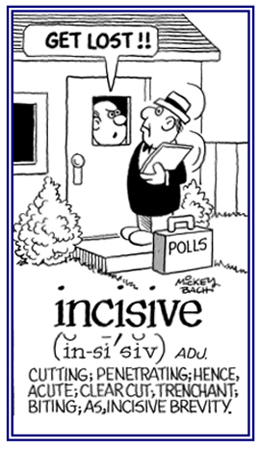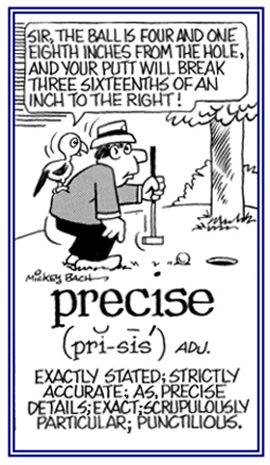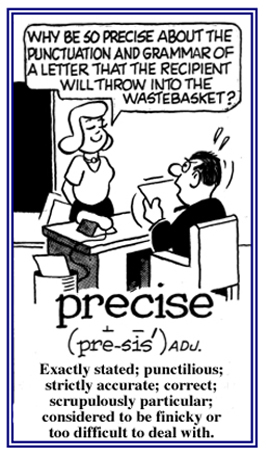-cise, -cis, -cide
(Latin: to cut, a cut)
From this combining form, we also get -cide, "kill", but don't confuse the two elements because they have different meanings and applications.
1. Often an editorial term for examining material from a manuscript or other written documents: Stephen’s editor wanted the excision of several paragraphs from his new book, thinking it would improve the cohesiveness of the novel; however, the author disagreed and refused to agree with the excision.
2. A surgical act or procedure to remove something that may cause illness or harm in a patient: The careful excision by the surgeon removed the tumor from the football player's knee and he was assured that the wound would heal and he would be able to play again soon.
3. Excommunication or banishment from a church congregation or refusing an individual the right to participate in the religious activities of a specific church: When a young man was arrested for a series of robberies and the pastor was informed of his multiple misdeeds, there was an excision of the person's name from membership.
2. A surgical act or procedure to remove something that may cause illness or harm in a patient: The careful excision by the surgeon removed the tumor from the football player's knee and he was assured that the wound would heal and he would be able to play again soon.
3. Excommunication or banishment from a church congregation or refusing an individual the right to participate in the religious activities of a specific church: When a young man was arrested for a series of robberies and the pastor was informed of his multiple misdeeds, there was an excision of the person's name from membership.
imprecise (adjective), more imprecise, most imprecise
Lacking clarity; not exact.
1. Neither exact nor accurate: Jane’s imprecision, or lack of following the cake directions, resulted in the pastry not rising in the oven because she forgot the baking powder!
2. Not well-defined; vague: Because of the imprecision of Tom’s answer, Mrs. Smith couldn’t accept it as correct due to the ambiguous and hesitating manner of his responses.
2. Not well-defined; vague: Because of the imprecision of Tom’s answer, Mrs. Smith couldn’t accept it as correct due to the ambiguous and hesitating manner of his responses.
incise (verb), incises; incised; incising
1. To cut into something, especially a body part during surgery.
2. To engrave or to carve something; to carve or engrave a pattern or design into something.
3. From French inciser from Latin incis-, past participle of incidere "cut into" and previously from caedere "to cut".
2. To engrave or to carve something; to carve or engrave a pattern or design into something.
3. From French inciser from Latin incis-, past participle of incidere "cut into" and previously from caedere "to cut".
1. A cut into a body tissue or organ; especially, one that is made during surgery: Most incisions are done in order to gain access to a diseased organ so it can be repaired or removed.
Sometimes an incision is made to relieve pressure; such as, from pus that has been formed as a result of an infection in the tissue cells.
2. The fact or quality of being quick to understand or able to express something clearly: Paul was known in school for his incisions, as determined by his precise responses to his teachers’ questions.
incisive (in SIGH siv) (adjective), more incisive, most incisive
1. Relating to someone being quick to understand, to analyze, or to act: The teacher, Mrs. Smart, was quite incisive in her lessons because she was very precise, discerning, and intelligent.
2. Characterized by clear and direct statements: Mr. Straight, the school principal, was very incisive, straightforward, and honest in his comments regarding the questions the teachers raised during the meeting.
3. A reference to a penetrating, clear, and sharp verbal response: Doris made an incisive demand that she didn't want to hear anything from the salesman who came to her door.

© ALL rights are reserved.
Go to this Word A Day Revisited Index
2. Characterized by clear and direct statements: Mr. Straight, the school principal, was very incisive, straightforward, and honest in his comments regarding the questions the teachers raised during the meeting.
3. A reference to a penetrating, clear, and sharp verbal response: Doris made an incisive demand that she didn't want to hear anything from the salesman who came to her door.

Go to this Word A Day Revisited Index
so you can see more of Mickey Bach's cartoons.
incisively (adverb), more incisively, most incisively
1. A tooth for cutting or gnawing; located in the front of the mouth in both jaws.
2. One of the flat sharp-edged teeth in the front of the mouth, used for cutting and tearing food.
3. In mammals, one of the four sharp teeth located between the canines in each jaw at the front of the mouth.
4. Etymology: from Modern Latin incisor, literally, "that which cuts into," from Latin incisus, past participle of incidere.
2. One of the flat sharp-edged teeth in the front of the mouth, used for cutting and tearing food.
3. In mammals, one of the four sharp teeth located between the canines in each jaw at the front of the mouth.
4. Etymology: from Modern Latin incisor, literally, "that which cuts into," from Latin incisus, past participle of incidere.
The inability to make up one's mind when faced with two or more possible choices; a wavering of resolve: George overcame his indecision about what to cook for dinner by picking up the telephone and ordering a pizza.
indecisive (adjective), more indecisive, most indecisive
1. Referring to not settling an issue or not making something certain or final: The business administration meeting resulted in an indecisive decision regarding whether to increase the salaries of its employees or waiting to see whether the company's profits can justify such an action.
2. Descriptive of someone who can't show the ability to make decisions quickly and effectively: Caroline was indecisive about what she would major in at the university because she was very interested in being a science teacher or a medical doctor.

© ALL rights are reserved.
Go to this Word A Day Revisited Index
2. Descriptive of someone who can't show the ability to make decisions quickly and effectively: Caroline was indecisive about what she would major in at the university because she was very interested in being a science teacher or a medical doctor.

Go to this Word A Day Revisited Index
so you can see more of Mickey Bach's cartoons.
indecisively (adverb), more indecisively, most indecisively
precise (adjective); more precise, most precise
1. Relating to something which is exact and accurate, or detailed and specific: Theodor, the university professor, always strives to present precise lessons so his students will understand what he is talking about.
2. A reference to someone who is very careful about small details; concerning something which is proper, correct, and faultless: Tim's mother is teaching him precise examples of correct behavior.
3. Denoting that something is the exact one that is being referred to: At that precise moment, it started to thunder and rain just as the weather forecaster had indicated on TV.
4. Descriptive of something that is distinct and correct, such as a talk or discussion: Henry is a very precise speaker when he is presenting the procedures that are necessary for a profitable income for his company to his fellow employees.
5. Etymology: from Latin praecis-, "cut short"; from prae-, "in advance" + caedere, "to cut."

© ALL rights are reserved.

© ALL rights are reserved.
Go to this Word A Day Revisited Index
2. A reference to someone who is very careful about small details; concerning something which is proper, correct, and faultless: Tim's mother is teaching him precise examples of correct behavior.
3. Denoting that something is the exact one that is being referred to: At that precise moment, it started to thunder and rain just as the weather forecaster had indicated on TV.
4. Descriptive of something that is distinct and correct, such as a talk or discussion: Henry is a very precise speaker when he is presenting the procedures that are necessary for a profitable income for his company to his fellow employees.
5. Etymology: from Latin praecis-, "cut short"; from prae-, "in advance" + caedere, "to cut."




